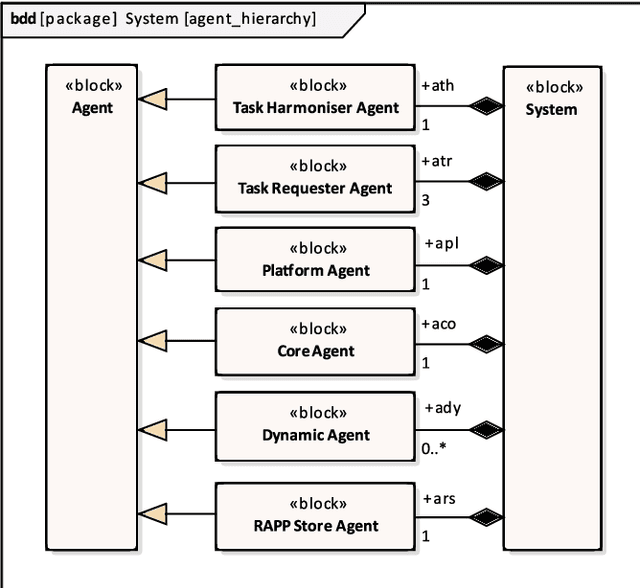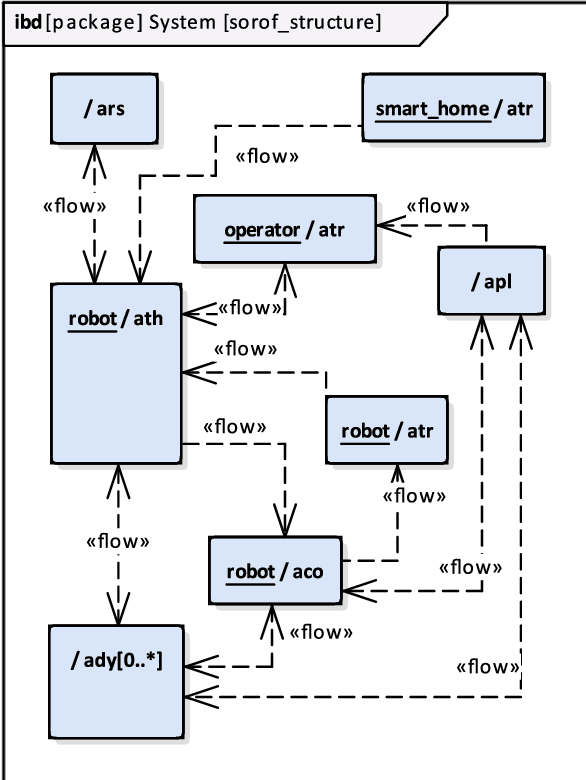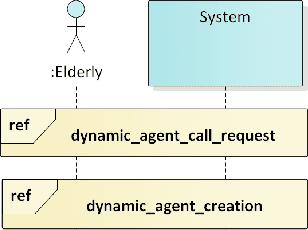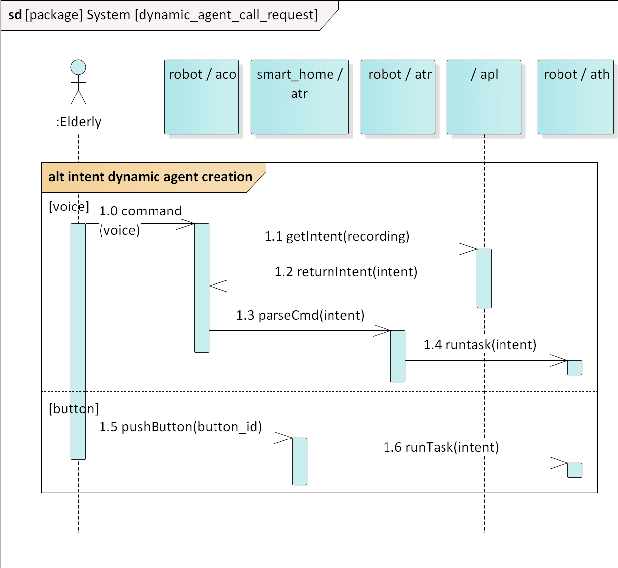Daniel Giełdowski
ROS-related Robotic Systems Development with V-model-based Application of MeROS Metamodel
Jun 10, 2025Abstract:As robotic systems grow increasingly complex, heterogeneous, and safety-critical, the need for structured development methodologies becomes paramount. Although frameworks like the Robot Operating System (ROS) and Model-Based Systems Engineering (MBSE) offer foundational tools, they often lack integration when used together. This paper addresses that gap by aligning the widely recognized V-model development paradigm with the MeROS metamodel SysML-based modeling language tailored for ROS-based systems. We propose a domain-specific methodology that bridges ROS-centric modelling with systems engineering practices. Our approach formalises the structure, behaviour, and validation processes of robotic systems using MeROS, while extending it with a generalized, adaptable V-model compatible with both ROS and ROS 2. Rather than prescribing a fixed procedure, the approach supports project-specific flexibility and reuse, offering guidance across all stages of development. The approach is validated through a comprehensive case study on HeROS, a heterogeneous multi-robot platform comprising manipulators, mobile units, and dynamic test environments. This example illustrates how the MeROS-compatible V-model enhances traceability and system consistency while remaining accessible and extensible for future adaptation. The work contributes a structured, tool-agnostic foundation for developers and researchers seeking to apply MBSE practices in ROS-based projects.
A framework for training and benchmarking algorithms that schedule robot tasks
Aug 29, 2024Abstract:Service robots work in a changing environment habited by exogenous agents like humans. In the service robotics domain, lots of uncertainties result from exogenous actions and inaccurate localisation of objects and the robot itself. This makes the robot task scheduling problem incredibly challenging. In this article, we propose a benchmarking system for systematically assessing the performance of algorithms scheduling robot tasks. The robot environment incorporates a room map, furniture, transportable objects, and moving humans; the system defines interfaces for the algorithms, tasks to be executed, and evaluation methods. The system consists of several tools, easing testing scenario generation for training AI-based scheduling algorithms and statistical testing. For benchmarking purposes, a set of scenarios is chosen, and the performance of several scheduling algorithms is assessed. The system source is published to serve the community for tuning and comparable assessment of robot task scheduling algorithms for service robots.
Rico: extended TIAGo robot towards up-to-date social and assistive robot usage scenarios
Jul 31, 2024Abstract:Social and assistive robotics have vastly increased in popularity in recent years. Due to the wide range of usage, robots executing such tasks must be highly reliable and possess enough functions to satisfy multiple scenarios. This article describes a mobile, artificial intelligence-driven, robotic platform Rico. Its prior usage in similar scenarios, the number of its capabilities, and the experiments it presented should qualify it as a proper arm-less platform for social and assistive circumstances.
HeROS: a miniaturised platform for research and development on Heterogeneous RObotic Systems
Mar 07, 2024Abstract:Tests and prototyping are vital in the research and development of robotic systems. Work with target hardware is problematic. Hence, in the article, a low-cost, miniaturised physical platform is presented to deal with experiments on heterogeneous robotic systems. The platform comprises a physical board with tiles of the standardised base, diverse mobile robots, and manipulation robots. The number of exemplary applications validates the usefulness of the solution.
An intent-based approach for creating assistive robots' control systems
May 25, 2020



Abstract:The current research standards in robotics demand general approaches to robots' controllers development. In the assistive robotics domain, the human-machine interaction plays a~substantial role. Especially, the humans generate intents that affect robot control system. In the article an approach is presented for creating control systems for assistive robots, which reacts to users' intents delivered by voice commands, buttons, or an operator console. The whole approach was applied to the real system consisting of customised \tiago{} robot and additional hardware components. The exemplary experiments performed on the platform illustrate the motivation for diversification of human-machine interfaces in assistive robots.
 Add to Chrome
Add to Chrome Add to Firefox
Add to Firefox Add to Edge
Add to Edge